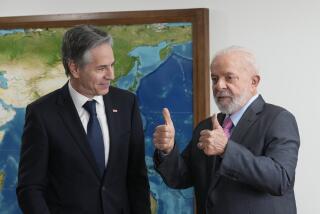Brazil’s leader again reaches out to protesters
- Share via
SAO PAULO, Brazil — A day after 1 million Brazilians took to the streets in protests that left two dead, President Dilma Rousseff again sought to reach out to demonstrators, praising the unexpected movement and presenting a program that would respond to some of its diverse demands.
Yet even as she delivered her televised speech in Brasilia, the capital, smaller demonstrations continued throughout the country and protesters blocked access to the nation’s largest airport. Friday was the ninth straight day of marches that have rocked the country as it hosts the FIFA Confederations Cup, an international soccer tournament seen as a test run for the 2014 World Cup and the 2016 Summer Olympics, both to be held in Brazil.
“If we can take advantage of this boost of new political energy, we can do a lot of things, better and faster, that Brazil has still not been able to achieve,” Rousseff said, announcing a national public transportation plan, a project to commit oil revenue to education spending and the importation of thousands of foreign doctors, and invitations to the protest leaders to converse with the president.
PHOTOS: Brazilians protest rising public transport costs
The demonstrations grew out of a much smaller movement demanding the reversal of a bus fare increase in the city of Sao Paulo. But they mushroomed when a heavy police crackdown last week generated widespread sympathy. In a now-familiar scenario that has seen people rise up from Tunisia to Turkey, Brazilians took to the streets in expanding numbers to voice anger on a much wider range of complaints.
The largest street manifestations in Brazil in 20 years have presented an unexpectedly awkward situation for Rousseff, a former left-wing guerrilla who handily won elections and has enjoyed high approval ratings for most of her presidency. Until recently, Brazil had been riding a wave of optimism and economic growth as the nation prepared for a visit from the pope next month and two of the world’s major sporting events.
As protesters railed against poor public services, corruption and money spent on sporting mega-events rather than education, Rousseff tried to ally herself with the “voices of the streets” in a statement Tuesday. Yet even after Sao Paulo and Rio de Janeiro agreed to drop their transit fare increase Wednesday, the crowds continued to grow, revealing a much deeper dissatisfaction with the political class.
“This is a very difficult situation for Rousseff, because the protesters have such a diverse set of demands and are often anti-political in general,” said Joao Augusto de Castro Neves, a political analyst at the Eurasia Group in Washington. “Brazil has come a long way in the last 10 to 15 years, but it’s still a very unequal country, and a lot of the optimism about big sporting events has turned into the realization of the cost of these games, and that Brazil really needs more public scrutiny on public spending.”
Rousseff’s speech didn’t appear to have any immediate effect on the groups in the streets, which have shown signs of internal conflict since Thursday.
At the protest in Sao Paulo, demonstrators shouted down and eventually attacked some members of left-wing parties and social movements who just last week formed the core of the protests, forcing them out of the street.
Saying that the protests had become so large that right-wing elements were infiltrating it, the Free Fare Movement — the original protest organizers — announced Friday that they would no longer stage events. That raised the question of whom exactly the government was dealing with now, or whether there was even a coherent set of demands that could be addressed.
“What I saw last night was a huge ego battle that drowned out the message of our protest,” said Fernando Gurjao Sampaio, a lawyer in the Amazon capital of Belem, writing on Facebook, where much of the country’s young people furiously debated the value and future of the protest movement Friday. “The mayor came to speak to us, and out of nowhere representatives from all kinds of different groups tried to present their own manifesto, leading to chaos and fighting, and people began to throw eggs and rocks.”
On Friday morning, a 54-year-old street cleaner died after inhaling tear gas fired during the tumult in Belem. Earlier, a protester died in Ribeirao Preto in Sao Paulo state after being hit by a car.
More protests were planned for Saturday.
In her speech, Rousseff noted that most of the protests were peaceful, but she promised to “maintain order,” noting that “violence put forth by a tiny minority cannot be allowed to stain a movement which is peaceful and democratic.”
Bevins is a special correspondent.
More to Read
Sign up for Essential California
The most important California stories and recommendations in your inbox every morning.
You may occasionally receive promotional content from the Los Angeles Times.










